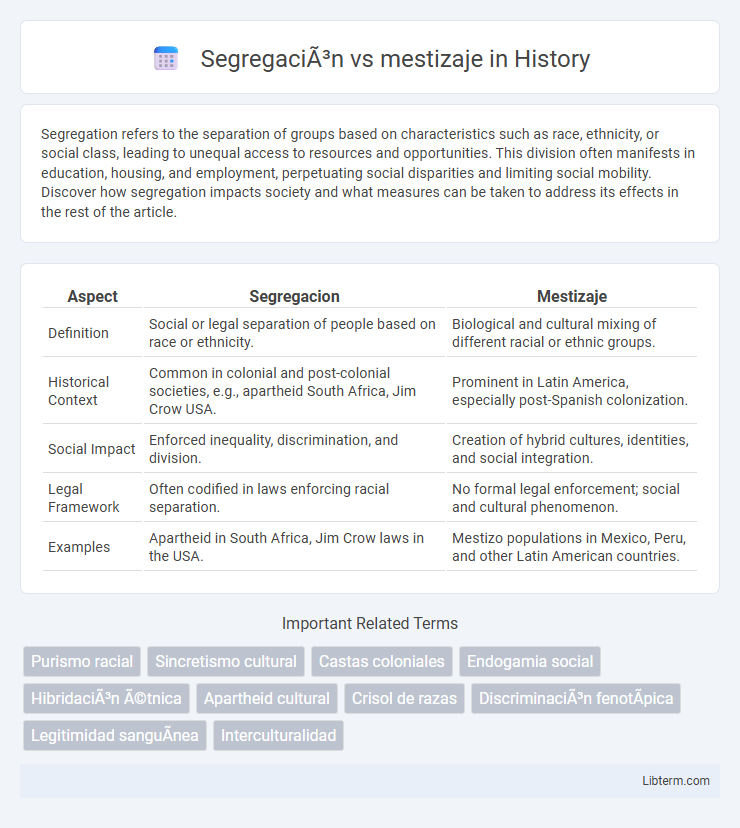Segregation refers to the separation of groups based on characteristics such as race, ethnicity, or social class, leading to unequal access to resources and opportunities. This division often manifests in education, housing, and employment, perpetuating social disparities and limiting social mobility. Discover how segregation impacts society and what measures can be taken to address its effects in the rest of the article.
Table of Comparison
| Aspect | Segregacion | Mestizaje |
|---|---|---|
| Definition | Social or legal separation of people based on race or ethnicity. | Biological and cultural mixing of different racial or ethnic groups. |
| Historical Context | Common in colonial and post-colonial societies, e.g., apartheid South Africa, Jim Crow USA. | Prominent in Latin America, especially post-Spanish colonization. |
| Social Impact | Enforced inequality, discrimination, and division. | Creation of hybrid cultures, identities, and social integration. |
| Legal Framework | Often codified in laws enforcing racial separation. | No formal legal enforcement; social and cultural phenomenon. |
| Examples | Apartheid in South Africa, Jim Crow laws in the USA. | Mestizo populations in Mexico, Peru, and other Latin American countries. |
Introducción a la segregación y el mestizaje
Segregation refers to the enforced separation of different racial or ethnic groups in daily life, often manifesting in legal, social, and economic inequalities. Mestizaje describes the process of racial and cultural mixing, particularly between Indigenous peoples, Europeans, and Africans in Latin America, leading to hybrid identities and cultures. These contrasting dynamics shape social structures and influence contemporary debates about identity, inclusion, and multiculturalism.
Orígenes históricos de la segregación
Historical origins of segregation trace back to colonial and post-colonial eras where legal systems institutionalized racial and social divisions, particularly in Latin America and the United States. Segregation emerged from policies that enforced separation of indigenous, African, and European descendants to maintain social hierarchies and control economic resources. These systems starkly contrasted with mestizaje, a process of racial and cultural mixing that challenged rigid segregation through the blending of indigenous, African, and European identities.
Surgimiento y desarrollo del mestizaje
The surgimiento y desarrollo del mestizaje in Latin America emerged from the contact and intermixing of Indigenous peoples, Europeans, and Africans during the colonial period, creating new cultural and biological identities. Mestizaje fostered the blending of languages, traditions, and ethnicities, becoming a defining characteristic of many Latin American societies. This process contrasted sharply with ideas of segregacion, which sought to maintain racial and cultural separations, yet mestizaje ultimately shaped social hierarchies and national identities throughout the region.
Factores sociales que impulsan la segregación
Social factors driving segregation include economic disparities, cultural differences, and systemic discrimination embedded in housing, education, and employment sectors. These factors create environments where marginalized communities have limited access to resources, reinforcing racial, ethnic, and socioeconomic divides. Segregation is perpetuated through policies and social practices that marginalize certain groups, hindering social integration and promoting inequality.
Impacto cultural del mestizaje
Mestizaje has profoundly influenced cultural identity by blending indigenous, European, and African elements to create rich, diverse traditions in language, art, and cuisine. This cultural fusion fosters social cohesion and promotes mutual understanding across different ethnic groups. The impact of mestizaje is evident in vibrant festivals, hybrid musical styles, and multilingual communities that celebrate shared heritage.
Consecuencias económicas de la segregación
Economic consequences of segregation include reduced labor market efficiency as marginalized groups face limited access to quality education and employment opportunities, leading to persistent income inequality. Segregation fosters underinvestment in segregated communities, resulting in poorer infrastructure, decreased property values, and lower economic growth rates compared to integrated areas. These disparities perpetuate cycles of poverty and hinder overall economic development within segregated regions.
Mestizaje y construcción de identidades nacionales
Mestizaje plays a crucial role in the construction of national identities by blending diverse ethnic, cultural, and racial backgrounds into a unified social fabric that challenges colonial segregation. This process fosters a shared identity rooted in mixed heritage, promoting social cohesion and cultural hybridity essential for nation-building in Latin America. Emphasizing mestizaje reshapes historical narratives to include indigenous, European, and African influences, thereby redefining citizenship and belonging within postcolonial societies.
Segregación en la educación y el acceso social
Segregacion en la educacion perpetua desigualdades sociales al limitar el acceso de grupos minoritarios a recursos y oportunidades de calidad, reforzando la exclusion social y economica. La segregacion racial y socioeconomica en escuelas reduce la movilidad social al crear entornos educativos segregados que afectan el rendimiento academico y las redes de apoyo. Politicas inclusivas y equitativas son esenciales para contrarrestar la segregacion educativa y promover el acceso social igualitario.
Desafíos contemporáneos del mestizaje
Contemporary challenges of mestizaje include the struggle to preserve indigenous identities amid cultural blending and social homogenization. Issues such as systemic racism, social inequality, and the marginalization of native languages highlight the ongoing tensions between celebrating mixed heritage and recognizing distinct ethnic origins. Efforts to address these challenges emphasize the importance of inclusive policies that honor both mestizo identity and indigenous rights.
Reflexiones y perspectivas para una sociedad inclusiva
Segregacion perpetuates social divides by isolating communities based on ethnicity or culture, hindering equal opportunities and social cohesion. Mestizaje, as a process of cultural and racial blending, promotes diversity and mutual understanding, fostering a more inclusive society. Contemporary reflections emphasize embracing mestizaje to dismantle systemic discrimination and build equitable frameworks that celebrate plural identities within a unified social fabric.
Segregación Infographic

 libterm.com
libterm.com